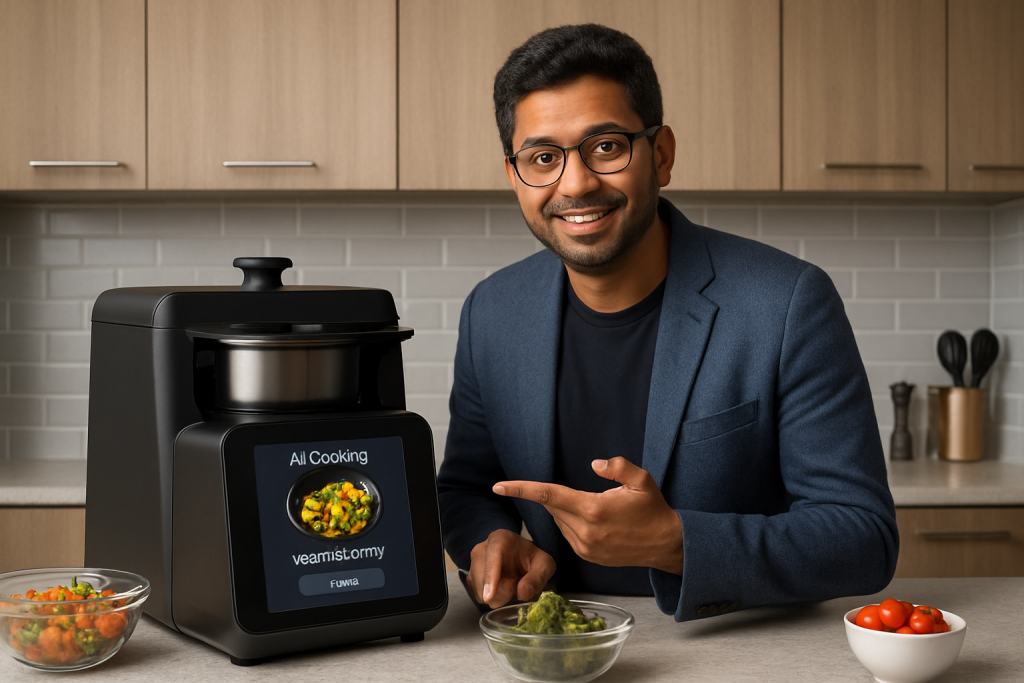Upliance.ai Develops India’s First AI Cooking Robot
Upliance.ai has created India’s first AI cooking robot, a cooking assistant that handles nearly all cooking tasks automatically. The device looks like a robot pot that chops, stirs, kneads, and blends ingredients before heating food to the right temperature.
Why It Matters Now
Indian households increasingly want convenience without sacrificing home-cooked meals. The pandemic pushed more families to cook at home, but busy lifestyles create demand for time-saving kitchen solutions. Upliance.ai fills this gap by combining traditional cooking with smart automation in home cooking.
The device connects to a tablet with over 500 recipes and customization options. It includes measuring tools like scales and spoons for precise ingredient portions. Users only need to add ingredients and do minimal chopping. The AI cooking robot handles the rest.
How It Solves a Key Problem
Founders Mahek Mody and Mohit Sharma, both IIT Bombay alumni, started the company in 2021. They learned to cook during pandemic lockdowns and saw the need for easier meal preparation. Their solution launched in 2023 but gained momentum after appearing on Shark Tank India in 2024.
The TV appearance drove sales up 243%. The device now sells on Amazon India for about 28,000 rupees (roughly $319). This price point targets middle-class families wanting smart kitchen upgrades.
Strategic Advantage
Upliance.ai entered the smart kitchen market early in India. Few competitors offer similar all-in-one cooking automation. The company benefits from first-mover advantage in a growing segment.
The 500-recipe database gives users variety without cookbook research. AI adjusts cooking parameters automatically, reducing cooking failures and food waste. Families save time while eating healthier home meals.
What Business Leaders Should Know
The success shows Indian consumers will pay premium prices for practical AI solutions. Upliance.ai proves that combining hardware with software creates competitive moats. The recipe database becomes more valuable over time.
Smart home adoption is accelerating in Indian cities. Kitchen appliances represent a large addressable market. Companies that solve real daily problems can scale quickly.
Market Impact in India
Nandan Nilekani, Co-Founder and Chairman of Infosys, spoke about AI implementation challenges. He said: “Everybody is talking about AI, so the whole thing is much more hyperventilating, but fundamentally, the challenges of implementation are the same, like anywhere else, and we have to make sure habits change. You have to change the workflow in enterprises or in government, so that AI is part of it. We have to do a lot of upgradation, but the fundamentals still matter. AI doesn’t mean it’s going to be easier to do. It’s going to take the same effort, if not more effort. Because you’re trusting the machine to give decisions more responsibility to make sure that it works.”
This reflects broader challenges Indian startups face when implementing AI. Success requires changing user behavior, not just adding technology.
Risks and Considerations
Upliance.ai must maintain recipe quality as it scales. User adoption depends on consistent cooking results. The company needs strong customer support since kitchen failures affect daily meals.
Competition will increase as the market grows. Larger appliance makers could enter with similar products. Upliance.ai’s advantage lies in its recipe database and early market education.
The startup represents a new category of practical AI applications for Indian households. Success depends on solving real problems rather than showcasing technology features.

